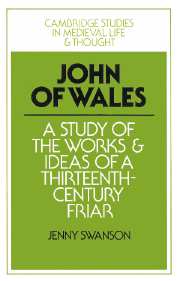Book contents
- Frontmatter
- Contents
- Acknowledgements
- List of Abbreviations
- Introduction
- 1 The career of John of Wales
- 2 The works of John of Wales: sources and technique
- 3 The Breviloquium de Virtutibus Antiquorum Principum et Philosophorum
- 4 Communiloquium, part 1: John of Wales on the state and its members
- 5 Communiloquium, parts 2 and 3: John of Wales on secular society
- 6 Communiloquium, parts 4–7: John of Wales on scholars and churchmen
- 7 Philosophers and saints: the Compendiloquium and Breviloquium de Sapientia Sanctorum of John of Wales
- 8 The works of John of Wales: spread and influence
- Conclusion
- Appendices
- 5 Checklist of early printed editions of works by John of Wales
- Bibliography
- Index
- Frontmatter
- Contents
- Acknowledgements
- List of Abbreviations
- Introduction
- 1 The career of John of Wales
- 2 The works of John of Wales: sources and technique
- 3 The Breviloquium de Virtutibus Antiquorum Principum et Philosophorum
- 4 Communiloquium, part 1: John of Wales on the state and its members
- 5 Communiloquium, parts 2 and 3: John of Wales on secular society
- 6 Communiloquium, parts 4–7: John of Wales on scholars and churchmen
- 7 Philosophers and saints: the Compendiloquium and Breviloquium de Sapientia Sanctorum of John of Wales
- 8 The works of John of Wales: spread and influence
- Conclusion
- Appendices
- 5 Checklist of early printed editions of works by John of Wales
- Bibliography
- Index
Summary
The appearance and growth of the Orders of friars, and the rise of the universities, are central features of the thirteenth century. The close link between friars and universities has long been recognised. The Franciscan and Dominican Orders, founded early in the century, quickly established the aim of providing informed preaching to the population as a whole. Informed preaching had as its prerequisite informed teaching: the friars moved rapidly into the university sphere, and soon established themselves at the heart of it. Franciscans and Dominicans alike organised their own schools and teachers, but their members played a major part in wider university life.
It is against this background that we must set the British Franciscan scholar John of Wales, who arrived in Paris from Oxford by early 1270, if not before. He was already an established scholar, having been lector to the Oxford Franciscans a decade previously. He must have been acquainted with fellow-Franciscans like Roger Bacon, John Pecham and Bonaventure. Bacon, who joined the Oxford Franciscans in c. 1257, had been John of Wales' junior at the Oxford convent for many years, and some of his Paris visits may have overlapped with John's. Pecham and Bonaventure were already resident in Paris when John of Wales arrived.
- Type
- Chapter
- Information
- John of WalesA Study of the Works and Ideas of a Thirteenth-Century Friar, pp. 1 - 3Publisher: Cambridge University PressPrint publication year: 1989



